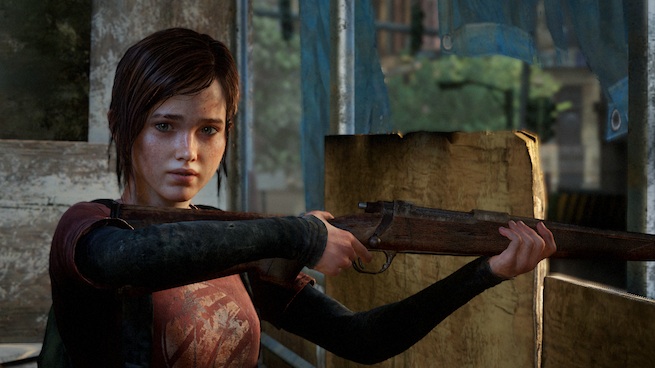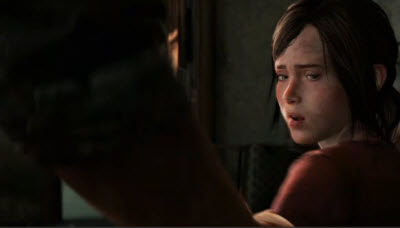The beginning and the ending
GamesBeat: The beginning of the game knocked me off my feet. It was very different in that you started out with the impact of this virus on everyone else. A typical zombie story or whatever, it seems like it would start out with an explanation of where the virus came from or something. You guys didn’t do any of that stuff. You just started with something weird happening in this town. Can you talk about that?
Straley: We didn’t want it to be about a government conspiracy. We didn’t want it to be about the backstory. It’s a game where you play as these two survivors making their way across a post-pandemic world. That’s our focus. Getting into all that other unwieldy exposition-y storytelling just gets in the way of what we’re trying to do.
Throughout production, Neil and I focused on how less is more. How do we strip down things to get to the core? How do we leave things to subtext? Specifically, using the video game medium for what you’re describing about how we started the game—It’s more intriguing to play through these events as they truly would happen to somebody, and not have the privileged knowledge about what’s on TV or how scientists have discovered this virus and how it spreads. It’s more interesting to see how it’s actually going to go down. It’s way more intense, because it leaves so much to your imagination.
The Hitchcock way of doing things is that you’re left to interpret it yourself, which is way worse than listening to somebody expound on how A matches with B and B equates to C. That’s not nearly as intriguing.
One other lesson learned is that you don’t have to show your whole game development. That was a success for us. We showed very little of the game and I think that paid off at the end. Going forward, I think we’ll keep doing that.
Druckmann: The intro is about a family. That’s ultimately what the story is about. The opening shot of the game is Sarah and the closing shot is Ellie. That’s what the story is about, the bond with these two girls.
GamesBeat: That was one of my questions. What should the gamer remember about the beginning when they come upon the ending?
Druckmann: That’s an interesting one. There’s the question of what Joel has lost. The game explores this concept of a fate worse than death. If you turn into one of the infected and you’re still conscious, but lost in there, that’s a fate worse than death. Here’s this guy who’s lost his kid. That’s the worst fate for a parent. You’d rather die a hundred times than experience your child dying. And here he is at the end about to experience that again. How far is he willing to go to not have that happen?
GamesBeat: When I wrote my own story about this, I used a line from Schindler’s List: “Whoever saves one life saves the world entire.” I always thought that was a great quote. The game and the ending made me think about it. The funny thing about it is that’s not true in this case. You save a life and doom the whole world.
Druckmann: Well, you’re a parent. We’ve talked to people who’ve finished the game. A lot of articles refer to Joel as a monster at the end – “What does it feel like to play a monster?” Just as I don’t feel that Marlene is a monster for wanting to kill a kid to save mankind, I don’t view Joel as a monster either. How can you ask him to do that?
You can argue that maybe he goes too far. There’s a conversation to be had. But for him, well, you can survive. He’s survived for a year in this world. What is it worth saving mankind if he has to go through hell again?
GamesBeat: One interesting thing to me is that the other game that’s really resonated this year is BioShock Infinite. The ending of that game is something that people have talked about a lot, and it’s very similar with The Last of Us. The thing that’s gone viral, that everyone’s talking about, is the ending.
Druckmann: That’s something that worked in our favor. We had focus tests at the office, where we brought people in to play the game, and for a long time, the ending tested badly. People felt it was unsatisfying. They wanted more of a climactic battle. They said that one of the characters should die, or maybe they both should die. Someone even suggested that Ellie shoot Joel at the end. But for us, we had this idea for the ending and we stuck to it. It felt like the most honest thing we could do for the characters.
Straley: With the example of BioShock, as well as our game—I played through BioShock, and there’s something to be said for not necessarily understanding exactly what’s going on. That helped me talk to people about it. There’s something about subtlety and ambiguity and subtext. When you see conversations between people out there and this stuff resonating with them, it gives us hope for the industry as a whole. Maybe people are maturing. We’re starting to look at them as an audience in the way that good filmmakers do, using subtlety and subtext in their filmmaking. It’s more interesting to let the viewer or the player figure things out for themselves.
We’re all grown up now. I’ve seen enough good stories in books and film. Now I want to see them in video games. When they come, that subtlety really sells. Now I can get in an interesting conversation with Neil about what this means over lunch or something. We find that more interesting, not only as developers but just as people who digest media.



